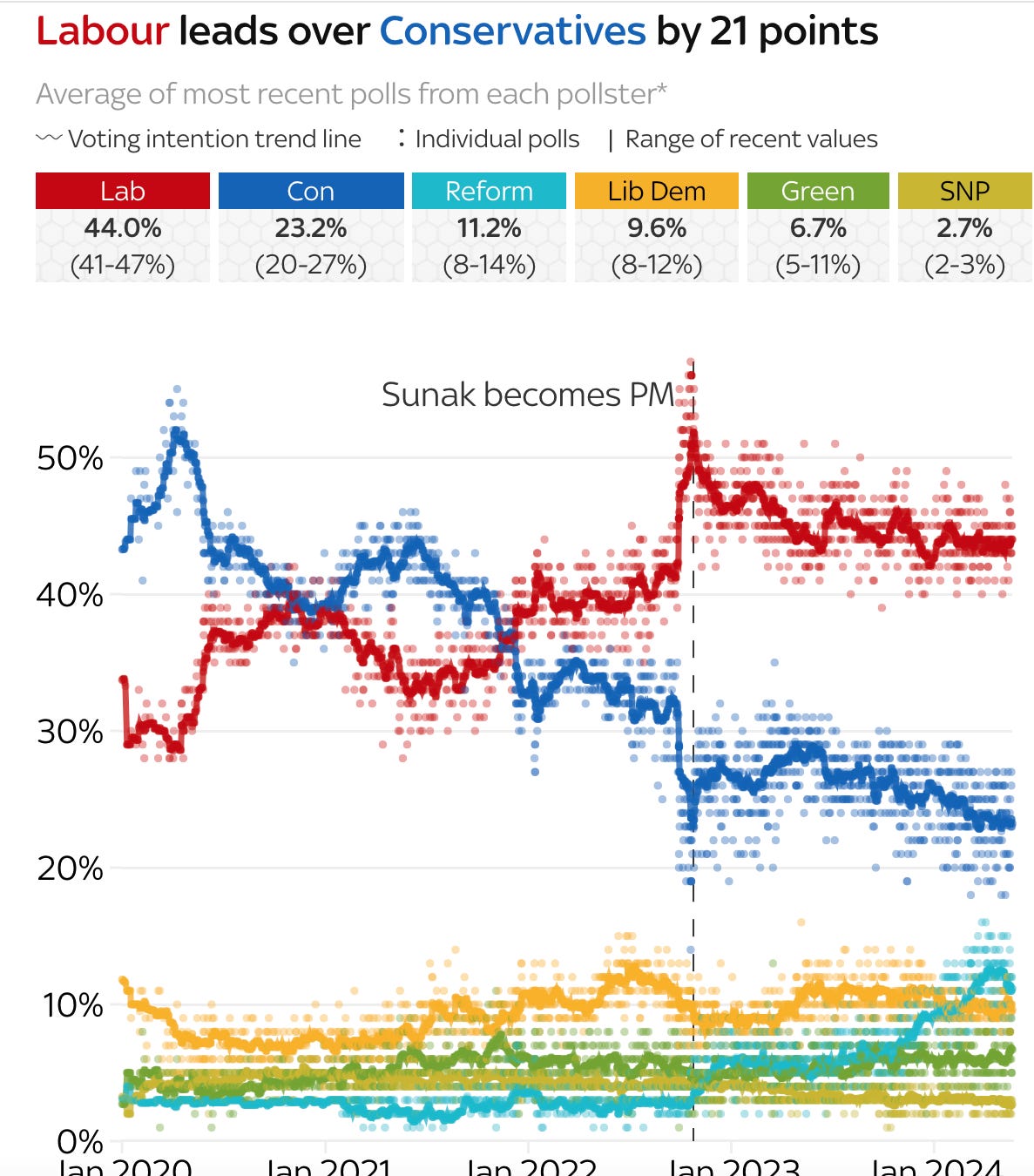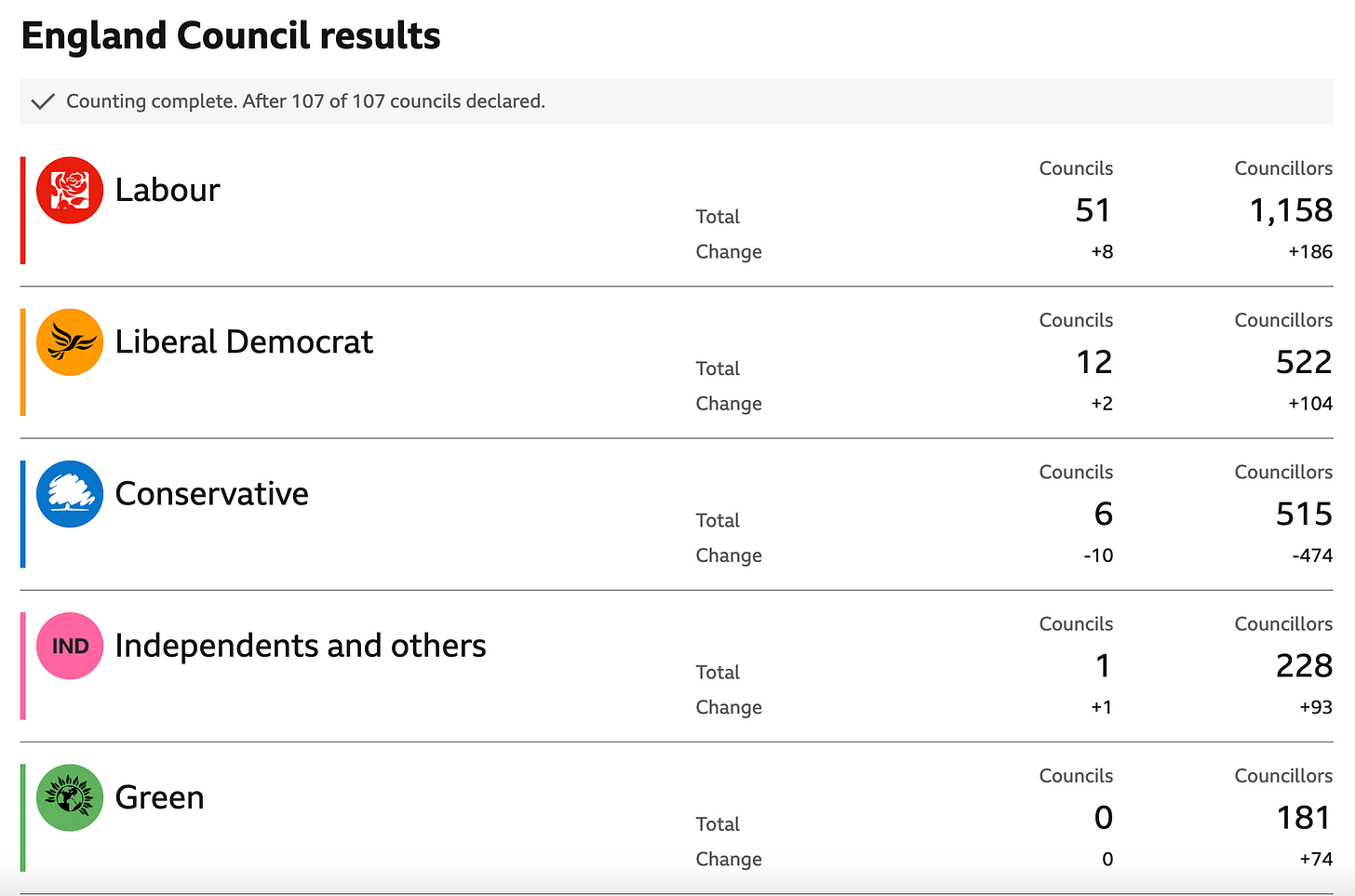The Tories are Down Over 20 Points in the Polling, So Why is Sunak Calling an Election Now?
May 22, 2024
I certainly was not expecting to write about UK politics when I woke up this morning. But events said differently.
As the day broke in London, The Guardian reported that UK Prime Minister Rishi Sunak was going to announce an early general election date of July 4th.1 Under UK law, a general election must be held every five years – in this case, by January 2025. Elections may be called early by the king at the recommendation of the PM.2 King Charles III has reportedly assented to dissolving Parliament and conducting an election in July. Parliament will be dissolved on or about May 30th. This is the traditional procedure in advance of a general election.
The timing of the election is indeed a surprise since Sunak’s Tory government is extremely unpopular and has been losing to Sir Keir Starmer’s Labour Party by 20 points or more in the polling since Sunak was elected PM. Polling is done fairly regularly in the UK – elections can come at any time and how a party in power is performing may encourage that party to call an early election. What’s odd here is that if the election were held today, it’s almost certain the Tories would be routed – perhaps in historic numbers. There is seemingly little reason to call an election until the last possible moment this year. So, why did he do it?
Source: Sky News (https://news.sky.com/story/general-election-poll-tracker-will-labour-or-the-conservatives-win-12903488). This chart shows the trend of the polling averages by party over the past four-plus years since the last general election. Unlike the color scheme used in the US media, blue denotes the Conservative Party (Tories) and red denotes the Labour Party.
Sunak’s explanation is apparently that he believes the economy is improving and wants to capitalize on that. This is unpersuasive to me. The economy never gets all-of-a-sudden better – at least in the minds of voters. A period of time of improvement – perceived or real – is usually necessary for voters to start feeling better about the economy and thus becoming persuadable that the governing party is doing a good job managing it. For this reason, it still makes more sense to wait until the late fall. If the economy is improving, voters are much more likely to feel it in the fall than in the next six weeks.
It is possible that Sunak thinks the economy may be showing signs of improvement, but it is unclear whether that improvement is sustainable or just a short-term bump. In that case, Sunak may be concluding he might be able to capitalize on an illusionary quick improvement in the economy. In any case, he is going to argue that things are getting better and hope voters will buy it. At the same time, he has signalled that he will attack the Labour Party as untrustworthy in an attempt to scare voters into changing leadership.
There is another reason why Sunak might be calling an early election. His leadership of the Conservative Party is on shaky ground. There are members of his party – and former members of the government – actively campaigning to replace him as party leader. Recent by-elections3 and local elections have gone very poorly for the Tories. When these results are considered with the polling, Sunak’s detractors argue that there is no way the party can win with him at the helm. They must replace him before the next general election. The surprise timing of this election may be a gambit by Sunak to prevent being removed as leader (and thus PM) before the next election. If the party loses in July, it was going to lose in the fall. But if it wins in July, it will be due to Sunak’s leadership which will allow him to keep his job. Sunak has probably figured out that he is risking being deposed by September if he were to call an election for late in the year. So, why not roll the dice now?
Sunak’s detractors have a point, but the party might be too unpopular with the voters to win a general election no matter who is in leadership. The party has had three leaders in the past five years, and the last two resigned in disgrace - one after only a month in office. It’s not clear running with a fourth leader this fall will inspire confidence in the voters. One thing that is happening is the UK is not happening in the US: election results and polling are coalescing. In the US over the past several years, the Democratic Party has overperformed in nearly all special and off-year elections yet the polling shows them in a close race or losing to Republicans in this fall’s US general election. In the UK, by-elections and local elections are confirming what the polls are saying: the Tories are in big trouble.
Source: BBC (https://www.bbc.com/news/election/2024/england/results). This chart shows five largest parties in terms of winning local council seats in England. The Tories lost nearly half of all their seats in this year’s local elections.
We have seen arguments here in the US among pundits, pollsters, and political observers over whether election results or polling is telling us the right story. Nate Cohn at the New York Times - along with others - thinks that there is a different type of electorate of high-information voters that is more likely to turnout in special and off-year elections and thus Democratic performance can be explained that way. Consequently, he is putting more faith in the polling for telling us the state of the general election. That may be the case this year, but it has not been in the past. Special and off-year elections in the run-up to a general election have been somewhat predictive of the mood of the electorate. And with a really big polling miss in 2020 that was rooted in poorly guessing the national turnout, it’s hard to believe the polling is getting it right when voters seem to be telling us differently when they go to the polls.
No one has this problem in the UK this year. All the data points agree: the Labour Party is winning and is likely to be busy putting together a government in six weeks. Sunak understands this. No matter when he calls the election, his party is likely to lose. But by calling it now he can ensure the voters are the ones who remove him rather than dissident members of his party.
General elections in the UK are usually held on a Thursday. July 4th is on a Thursday this year. The Fourth is not a holiday in the UK. In fact, I assume it’s the very opposite of a holiday there.
There was a short period about a decade ago, where this royal prerogative was revoked, but it has since been reinstated by Parliament.
A “by-election” is what a special election is called in the UK and Canada.




